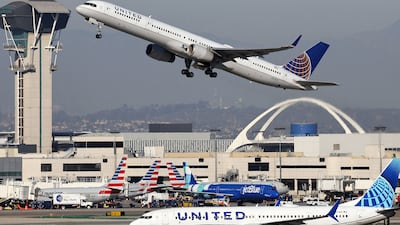US airlines on Wednesday drew bipartisan condemnation from politicians for using complicated and concealed fees to increase seat and luggage costs for consumers while generating billions of dollars in revenue.
“They feel, with more than understandable justification, that they are piggy banks being shaken down by these skyrocketing fees that seem to have no connection to any cost that the airlines incur,” US Senator Richard Blumenthal, who chairs the Permanent Subcommittee on Investigations, said during a hearing.
Wednesday's hearing, named "The Sky’s the Limit – New Revelations About Airline Fees", follows a report released last week accusing airlines of introducing junk fees over the past 20 years to boost their revenue and make flying more costly for consumers.
The report focused on five major US airlines – American, Delta, United, Spirit and Frontier, whose executives testified before the subcommittee. American, Delta and United are part of the “Big 4" (along with Southwest) which dominate the US domestic market. Southwest, which currently does not charge for luggage or seating assignments, was exempt from the report.

The committee's report – the work of a year-long investigation – found that the five airlines received $12.4 billion in collective revenue from seat fees last year, a 50 per cent increase from 2018. The report also said Frontier, Spirit and United airlines may be avoiding federal transportation excise taxes by labelling parts of their charges as non-taxable fees.
Mr Blumenthal also pushed back on notions that airlines are implementing these higher fees to offset rising costs, saying that the report found checked bag fees are unconnected to costs to transport them.
“And it's obvious that assigning paid seats is pure profit,” he added.
Frontier Airlines raised the price of its most expensive extra legroom seat from $50 in 2018 to $141 last year, according to the report. United's most expensive legroom fee increase from $256 to $319 during this period while Spirit's most premium offering rose from $140 to $899. The report also noted American's top extra legroom fee dropped by $20.
Mr Blumenthal said airlines are using new algorithms and potentially artificial intelligence to implement consumer-specific pricing which “will make it much easier for airlines to discriminate against particular passengers” and raise fees.
Airlines counter the claim
Airline executives countered that their fees are transparent and offer an array of options for customers who have different needs for flying.
“Our customers who prioritise affordability have the option to choose a lower, fair product, and in doing so, opt out of paying for additional services they do not need nor want,” said United Airlines executive vice president Andrew Nozella.
“But we also have customers who seek more services, and they retain the ability to use this value for an incremental fee, like a seat with extra legroom or checked bags.”
The report also found Frontier and Spirit airlines paid gate agents $26 million between 2022 and 2023 to catch customers for not following airline bag policies, often forcing those customers to pay a bag fee. Frontier estimated it would generate more than $40 million in fees from enforcement in the programme's first year, according to the report.
Frontier Airlines' senior vice president Robert Schroeter confirmed the carrier pays gate agents to pick out customers' bags that are allegedly too large.
"So how much have you paid people to pull out customers who are in line with a bag that's two centimetres too big?" Mr Hawley asked Mr Schroeter.
"Well, we recognise this is a hard job, and so, therefore, we incentivise them to do that" before confirming the carrier pays employees $10 per bag, said the Frontier executive.
Spirit Airlines executive Matthew Klein said the carrier stopped paying gate agents to confiscate bags on September 30.
A coalition of airlines in May filed a lawsuit against the Department of Transportation over rules requiring carriers to disclose fees upfront. The department said the rule would save half-a-billion dollars for customers each year. A US federal appeals court temporarily blocked the rule in July following a request from the airlines coalition.
Airline executives said they would not drop the lawsuit when pressed during Wednesday's hearing.



